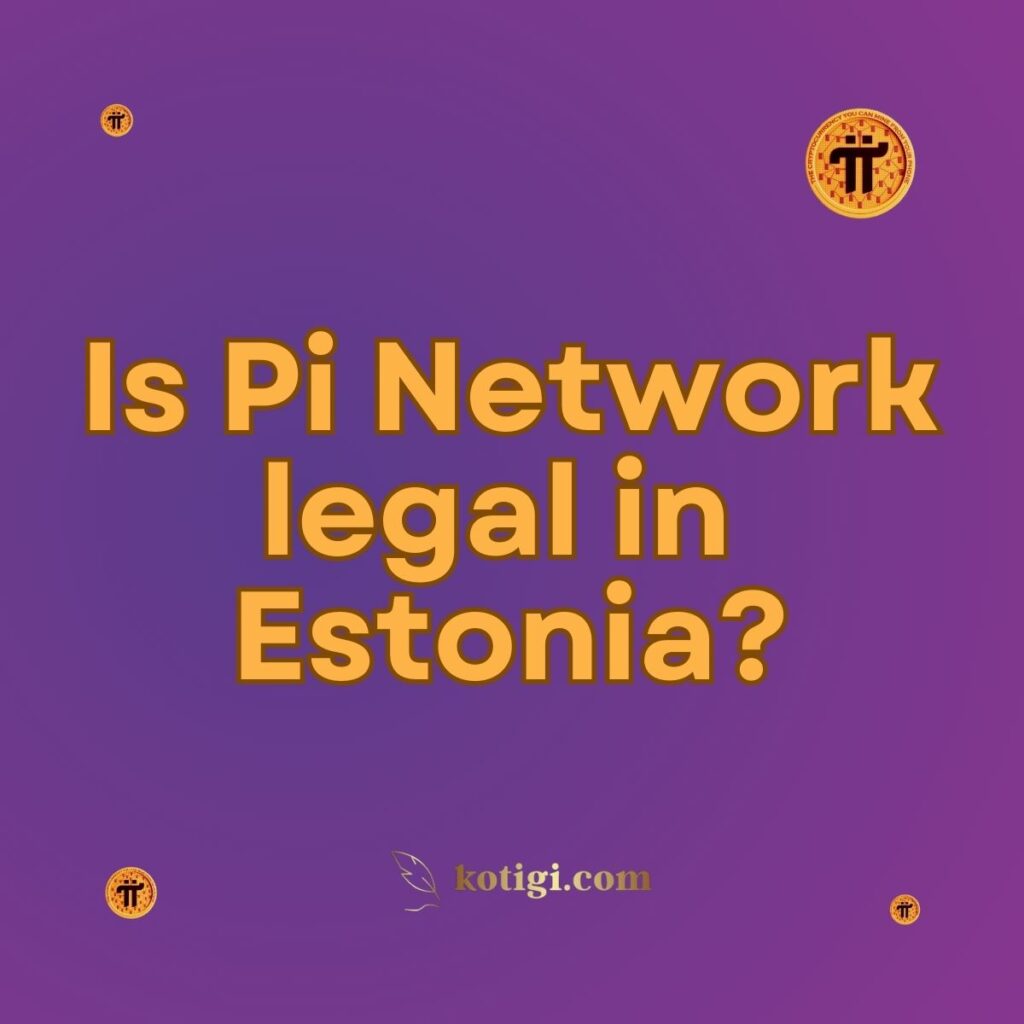
Is Pi Network legal in Estonia?
Pi Network is currently legal in Estonia, a country known for its progressive stance on technology and digital innovation. While Estonia has a regulatory framework for cryptocurrencies, Pi Network operates in an unregulated space, meaning users can participate without breaching any specific laws. However, future changes to Estonia’s cryptocurrency laws could affect Pi Network’s operations. Users should remain informed about legal developments and be cautious of risks associated with digital assets.
Introduction
Estonia is widely recognized as a global leader in digital innovation, making it a favorable environment for emerging technologies like blockchain and cryptocurrency. With Pi Network gaining momentum as a mobile cryptocurrency mining platform, many Estonians are eager to know if participating in the network is legal. Pi Network operates in an area that is not heavily regulated, allowing users to engage in mobile mining without legal challenges at the moment. This article explores the legal status of Pi Network in Estonia, the country’s regulatory framework for cryptocurrencies, and what users should consider when participating in this platform.
1. Cryptocurrency Regulations in Estonia
1.1 Estonia’s Forward-Thinking Approach to Digital Assets
Estonia has been at the forefront of digital transformation, implementing e-government systems and fostering a tech-friendly environment for entrepreneurs and startups. In the cryptocurrency space, Estonia has positioned itself as a leader, particularly through its e-residency program, which allows global entrepreneurs to establish and manage businesses digitally from anywhere in the world. While cryptocurrencies are not considered legal tender in Estonia, the government has embraced their potential and created a regulatory framework that governs certain aspects of their use.
1.2 Estonia’s Regulatory Framework for Cryptocurrencies
The Estonian Financial Intelligence Unit (FIU) oversees the country’s cryptocurrency regulations. Companies that offer crypto services, such as exchanges and wallet providers, are required to obtain a license from the FIU. However, Pi Network operates differently from traditional crypto services—it is a mobile-based mining platform, and its tokens are not yet listed on exchanges. Therefore, as of now, Pi Network does not fall under these licensing requirements.
1.3 Tax Implications for Cryptocurrency Users in Estonia
While Pi tokens currently lack market value, users in Estonia should be aware that any eventual profits derived from Pi tokens—once they become tradeable—would be subject to taxation. Estonia has clear tax guidelines for cryptocurrencies, classifying them as digital assets. Users are required to report any gains from selling or trading cryptocurrencies as part of their annual tax declaration. As Pi evolves, it will be important for Estonian users to track their activities and prepare for any potential tax liabilities.
2. Legal Considerations for Pi Network Users in Estonia
2.1 Current Legal Status of Pi Network in Estonia
Pi Network operates in a legal gray area, meaning that while there are no laws specifically targeting the platform, it is not directly regulated either. This is typical for many emerging cryptocurrencies and blockchain projects. As long as Pi Network does not engage in illegal financial activities or breach existing anti-money laundering (AML) laws, users in Estonia are free to participate.
2.2 Compliance with Estonia’s Anti-Money Laundering (AML) Laws
Estonia has some of the strictest AML regulations in Europe, which were updated in 2020 to align with the European Union’s Fifth Anti-Money Laundering Directive (5AMLD). While Pi Network is currently in a phase where users mine Pi through mobile devices without exchanging tokens for real money, future phases of the project could introduce AML requirements, especially if token trading becomes possible. Estonian users should be aware that stricter regulations may apply in the future, possibly requiring KYC (Know Your Customer) verification and compliance with AML laws.
2.3 E-Residency and Pi Network Participation
Estonia’s e-residency program allows individuals from around the world to establish and manage businesses within Estonia’s legal framework. While Pi Network users in Estonia do not need e-residency to participate, it could open doors for entrepreneurs looking to integrate blockchain technology into their business models. E-residents who are interested in crypto mining or blockchain development could benefit from participating in Pi Network, particularly if the platform introduces developer tools or APIs in the future.
3. Risks and Challenges for Estonian Users
3.1 Regulatory Uncertainty
One of the major challenges for Estonian Pi Network users is regulatory uncertainty. Although Estonia has created a supportive environment for cryptocurrencies, future regulations could impact how Pi Network operates within the country. As the European Union pushes forward with regulations such as the Markets in Crypto-Assets (MiCA) framework, Estonia may adopt additional measures that affect mobile mining and the use of digital assets like Pi.
3.2 Potential for Taxation
While Pi tokens are not currently tradable, once the platform transitions to a fully decentralized blockchain and Pi tokens gain value, Estonian users will need to report their earnings. The Estonian Tax and Customs Board (ETCB) requires citizens to declare all forms of income, including profits from cryptocurrency trading. This means that users who hold Pi tokens will need to track their transactions and prepare for possible taxation in the future.
3.3 Data Privacy and Security Concerns
Given the decentralized nature of Pi Network, users should take care to protect their personal information. Estonia is known for its strong data privacy laws, and users will want to ensure that Pi Network complies with the General Data Protection Regulation (GDPR), the EU’s comprehensive data privacy law. Users should be cautious when sharing personal information within the app, especially as Pi Network grows and potentially attracts more attention from hackers or malicious actors.
4. Opportunities for Pi Network Users in Estonia
4.1 Early Adoption Benefits
Estonian users who join Pi Network early stand to benefit from being early adopters of an emerging cryptocurrency. If Pi becomes widely used and traded on exchanges, those who mined Pi during its early stages may gain significant rewards. As Estonia is known for its tech-savvy population, Pi Network has the potential to resonate well with users looking for innovative ways to engage with the digital economy.
4.2 Blockchain Integration and Development
Estonia’s embrace of blockchain technology makes it an ideal environment for Pi Network’s growth. Estonian developers may find opportunities to integrate Pi’s blockchain into their projects, especially once the platform’s development tools and APIs become available. This could lead to community-driven projects that enhance both Pi Network’s ecosystem and Estonia’s reputation as a leader in blockchain innovation.
4.3 Global Community and Collaboration
Estonian users can tap into Pi Network’s global community to collaborate with other cryptocurrency enthusiasts. The platform’s decentralized approach allows users to contribute to the network’s growth, participate in security nodes, and even propose new features or applications. Given Estonia’s collaborative tech culture, users may find Pi Network to be a valuable platform for engaging with like-minded individuals across the world.
5. What to Expect in the Future?
5.1 Increased Regulatory Oversight
As Pi Network moves closer to launching a decentralized mainnet and facilitating token trading, Estonian users should anticipate more regulatory oversight. The Markets in Crypto-Assets (MiCA) regulation is set to create a comprehensive framework for digital assets across the European Union, and Estonia will likely align its policies accordingly. Pi Network users in Estonia should stay informed about these developments to ensure they remain compliant with any new laws.
5.2 Enhanced Security and Privacy Features
As the platform grows, Pi Network is expected to implement stronger security and privacy measures. Estonian users, accustomed to high standards of digital privacy, will likely expect Pi Network to comply with the EU’s GDPR regulations. Future updates to the platform could introduce enhanced encryption and privacy tools to protect users’ personal data, aligning Pi Network with Estonia’s strong data protection laws.
5.3 Potential for Token Trading and Real-World Use
As Pi Network progresses, Estonian users may eventually be able to trade Pi tokens on the open market, allowing for real-world use cases such as payments, remittances, and integration with local businesses. Estonia’s openness to cryptocurrency adoption positions it as an ideal market for Pi Network to expand its utility. Users who mine Pi now may find themselves in a favorable position once these developments occur.
Conclusion
Pi Network is currently legal in Estonia, and Estonian users can freely participate in the platform without facing legal repercussions. Estonia’s progressive stance on digital assets, coupled with its supportive regulatory framework, makes it an ideal environment for Pi Network’s growth. However, as the platform develops, users should remain cautious and stay informed about future regulatory changes, particularly in light of EU-wide initiatives like the MiCA framework. By being early adopters and actively participating in Pi Network, Estonian users may reap significant benefits in the future.
Key Takeaways
- Pi Network is legal in Estonia, with no current regulations prohibiting its use or mining activities.
- Estonia’s progressive approach to cryptocurrencies positions it as an ideal market for Pi Network, but users should be aware of potential future regulations.
- Users should be prepared for tax implications once Pi tokens become tradeable, as profits from cryptocurrency transactions are subject to taxation in Estonia.
- Data privacy is a key concern, and users should ensure that Pi Network complies with GDPR regulations to protect their personal information.
- Early adoption may offer significant benefits, particularly for users who mine Pi tokens before they gain market value and real-world utility.





